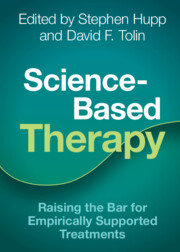Book contents
- Science-Based Therapy
- Series page
- Science-Based Therapy
- Copyright page
- Dedication
- Contents
- Tables
- Contributors
- Preface
- Acknowledgments
- 1 What Is Science-Based Therapy?
- 2 Depressive Disorders
- 3 Bipolar Disorder
- 4 Anxiety Disorders
- 5 Obsessive-Compulsive Disorder
- 6 Posttraumatic Stress Disorder
- 7 Dissociative Disorders
- 8 Pain
- 9 Eating Disorders
- 10 Insomnia Disorder
- 11 Sexual Dysfunctions
- 12 Substance Use Disorders
- 13 Cognitive Loss
- 14 Antisocial Behavior
- 15 Borderline Personality and Other Personality Disorders
- 16 Psychosis and Schizophrenia
- 17 Autism Spectrum and Intellectual Developmental Disorder
- 18 Attention-Deficit/Hyperactivity Disorder
- 19 Tic Disorders
- 20 Couples Discord
- 21 Psychotherapy Relationships
- Postscript
- Index
- References
21 - Psychotherapy Relationships
Published online by Cambridge University Press: 10 January 2025
- Science-Based Therapy
- Series page
- Science-Based Therapy
- Copyright page
- Dedication
- Contents
- Tables
- Contributors
- Preface
- Acknowledgments
- 1 What Is Science-Based Therapy?
- 2 Depressive Disorders
- 3 Bipolar Disorder
- 4 Anxiety Disorders
- 5 Obsessive-Compulsive Disorder
- 6 Posttraumatic Stress Disorder
- 7 Dissociative Disorders
- 8 Pain
- 9 Eating Disorders
- 10 Insomnia Disorder
- 11 Sexual Dysfunctions
- 12 Substance Use Disorders
- 13 Cognitive Loss
- 14 Antisocial Behavior
- 15 Borderline Personality and Other Personality Disorders
- 16 Psychosis and Schizophrenia
- 17 Autism Spectrum and Intellectual Developmental Disorder
- 18 Attention-Deficit/Hyperactivity Disorder
- 19 Tic Disorders
- 20 Couples Discord
- 21 Psychotherapy Relationships
- Postscript
- Index
- References
Summary
The therapeutic relationship constitutes the heart and soul of the enterprise. Second only to the patient’s contribution, the relationship is the most powerful predictor of, and contributor to, outcome. Its effectiveness cuts across theoretical orientations (transtheoretical) and largely across client problems (transdiagnostic). This chapter reviews evidence-based psychotherapy relationships, primarily with adults in individual treatment. We begin by defining terms and summarizing the meta-analytic evidence on effective relationship behaviors or components (what works). That is followed by a summary of ineffective or discredited relationship behaviors (what does not work). We advance therapeutic and training practices based on this research evidence. The chapter finishes with multiple caveats, concluding thoughts, and useful resources.
Keywords
- Type
- Chapter
- Information
- Science-Based TherapyRaising the Bar for Empirically Supported Treatments, pp. 381 - 398Publisher: Cambridge University PressPrint publication year: 2025
References
Useful Resources
Norcross, J. C., & Lambert, M. J. (Eds.). (2018). Evidence-based psychotherapy relationship III (special issue). Psychotherapy, 55(4), 303–537.
Norcross, J. C., & Lambert, M. J. (Eds.). (2019). Psychotherapy relationships that work. Volume 1: Evidence-based therapist contributions (3rd ed.). Oxford University Press.
Norcross, J. C., & Wampold, B. E. (2019). (Eds.). Psychotherapy relationships that work. Volume 2: Evidence-based responsiveness (3rd ed.). Oxford University Press.
Norcross, J. C., & Karpiak, C. P. (2023). Relationship factors. In Miller, S. D., Chow, D., Malins, S., & Hubble, M. A. (Eds.), Field guide to better results: Individualizing a deliberate practice. American Psychological Association.
Society for the Advancement of Psychotherapy (APA Division of Psychotherapy). (2020). Teaching and learning evidence-based relationships: Interviews with the experts. societyforpsychotherapy.org/teaching-learning-evidence-based-relationships.

